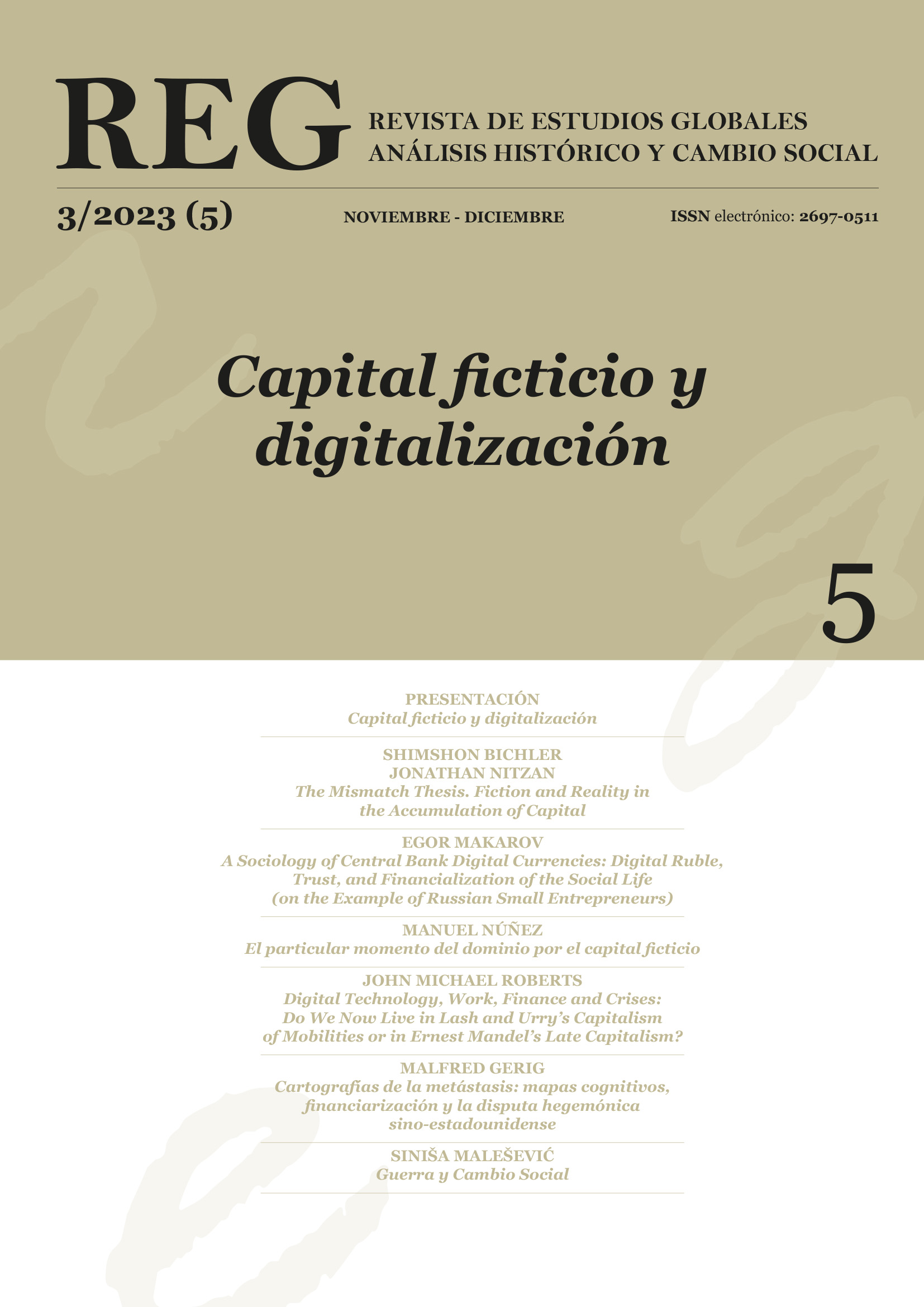Digital Technology, Work, Finance and Crises: Do We Now Live in Lash and Urry’s Capitalism of Mobilities or in Ernest Mandel’s Late Capitalism?
Abstract
The single and combined work of Scott Lash and John Urry have become extremely significant in the social sciences in the UK and beyond. In particular, one of their principal ideas that dominant capitalist countries have made a transition to a ‘disorganized’ and ‘mobile’ era founded on digital networks, global flows of people, objects, images and texts, decentralized and flexible work practices, declining industrialized social classes, and a loss of power for the nation-state to regulate flows of finance, has influenced many researchers. Their work has even helped to establish of a new ‘mobilities’ paradigm in the social sciences. Ernest Mandel has also explored the impact of digital technology on capitalist restructuring. Indeed, he claims that from 1945 onwards, a ‘late capitalist’ wave emerged predicated on the rise of factors like automation, the service sector, and new class identities. Unlike Lash and Urry, however, Mandel applies Marxist theory to investigate these changes. The aim of this paper is to draw on Mandel’s ideas to examine critically the account put forward by Lash and Urry. Five areas in particular will be discussed: theoretical differences between Lash and Urry and Mandel; the transition between different phases in capitalism; the changing composition of social class; whether the workplace is now dominated by decentralized and flexible networks; and the relationship between finance, the state and digital technology.
Downloads
Metrics
-
Abstract370
-
pdf237
References
Alloul, J. (2021) “‘Traveling Habitus” and the New Anthropology of Class: Proposing a
Transitive Tool for Analyzing Social Mobility in Global Migration’, Mobilities 16(2): 178-193.
Bastos, C., Novoa, A. and Salazar, N.B (2021) Mobile Labour: An Introduction’, Mobilities
(2): 155-163.
Bell, D. (1999) The Coming of Post-Industrial Society, New York: Basic Books.
Bilić, P., Prug, T, and Žitko, M. (2021) The Political Economy of Digital Monopolies, Bristol:
Bristol University Press. et al. 2021
Boes, A., Kämpf, T., Langes, B., and Lühr. (2017) ‘The Disruptive Power of Digital
Technology’, in Briken, K., Chillas, S., and Krzywdzinski, M. (eds), The New Digital Workplace, London: Routledge.
Bonefeld, W., Brown, A. and Burnham, P. (1995) A Major Crisis? The Politics of Economic
Policy in Britain in the 1990s, Hants: Dartmouth.
Breque, M., Nul, D. L. and Petridis, A. (2021) Industry 5.0: Towards a Sustainable, Human-
centric and Resilient European Industry, Policy Brief, European Commission: 1-48, available at: https://op.europa.eu/en/publication-detail/-/publication/468a892a-5097-11eb-b59f-01aa75ed71a1/ (accessed 03/01/23).
Büscher, M. and Urry, J. (2009) ‘Mobile Methods and the Empirical’, European Journal
of Social Theory 12(1): 99-116.
Callon, M., Méadel, C. and Rabeharisoa, V. (2005) ‘The Economy of Qualities’ in A. Barry
and D. Slater (eds) The Technological Economy, London: Routledge: 28-50.
Capra, F. (1996) The Web of Life, New York: Anchor Books.
Capra, F. (2002) The Hidden Connections, London: HarperCollins.
Carchedi, G. (1991) Frontiers of Political Economy, London: Verso.
Castells, M. (2000) The Rise of the Network Society, second edition, Oxford:
Blackwell.
Castells, M. (2009) Communication Power, Oxford: Oxford University Press.
Chen, Y. P., Velu, C., and McFarlane, D. (2023) ‘The Effect of Robot on Profit Margins’,
IEEE Transactions on Engineering Management, August, early view: 1-13.
De Stefano, V. and Doellgast, V. (2023) ‘Regulating AI at Work: Labour Relations,
Automation, and Algorithmic Management’, Transfer 29(1): 9-20.
della Porta D, Fernández J, and Kouki H (2017) Movement Parties against Austerity.
Cambridge: Polity.
Dyer-Witheford, N. (2015) Cyber-Proletariat, London: Pluto.
Giddens, A. (1990) Consequences of Modernity, Cambridge: Polity.
Gorz, A. (1987) A Farewell to the Working Class, London: Pluto.
Foster, J. B. (2022) Capitalism and the Anthropocene, New York: Monthly Review Press.
Harvey, D. (2014) Seventeen Contradictions and the End of Capitalism, London: Profile.
Husson, M. (2000) ‘After the Golden Age’, in G. Achcar (ed), The Legacy of Ernest Mandel,
London: Verso.
Inglehart, R. (1971) ‘The Silent Revolution in Europe’, The American Political Science
Review 65(4): 991-1017.
Lange, A-C, Lenglet, M. and Seyfert, R (2016) ‘Cultures of High-frequency Trading:
Mapping the Landscape of Algorithmic Developments in Contemporary Financial Markets’, Economy and Society 45(2): 149–165.
Lash, S. (2002) Critique of Information, London: Sage.
Lash, S. (2011) Intensive Culture, London: Sage.
Lash, S. and Urry, J. (1987) The End of Organised Capitalism, Cambridge: Polity.
Lash, S. and Urry, J. (1994) Economies of Signs and Space, London: Sage.
Laaser, K. and Bolton, S. (2017) ‘Ethics of Care and Co-worker Relationships in UK Banks’,
New Technology, Work and Employment 32(3): 213-227.
Mandel, E. (1968) Marxist Economic Theory, London: Merlin Press.
Mandel, E. (1975) Late Capitalism, London: New Left Books.
Mandel, E. (1980) The Second Slump, London: Verso.
Mandel, E. (1992a) Money and Power, London: Vero.
Mandel, E. (1992b) ‘Introduction’, in K. Marx, Capital, vol. 2, London: Penguin.
Mandel, E. (1995) Long Waves of Capitalist Development, London: Verso.
Mandel, E. (2009) Europe vs. America, New York: Monthly Review Press.
Mansell, R. and Javary, M. (2004) ‘New Media and the Forces of Capitalism’ in C. Sparks
and A. Calabrese (eds), Toward a Political Economy of Culture: Capitalism and Communication in the Twenty-First Century, London: Rowman and Littlefield.
Marx, K. (1988) Capital, vol. 1, London: Pelican.
McChesney, R. W. (2013) Digital Disconnect, New York: The New Press.
McNally, D. (2011) The Global Slump, Oakland, CA: PM Press.
Moody, K. (2007) U.S. Labour in Trouble and Transition, London: Verso.
Moody, K. (2017) On New Terrain, Chicago: Haymarket.
Office for National Statistics (ONS) (2022) ‘Industry and Occupation, England and Wales:
Census 2021’, 8 December, available at: https://www.ons.gov.uk/employmentandlabourmarket/peopleinwork/employmentandemployeetypes/bulletins/industryandoccupationenglandandwales/census2021 (accessed 08/6/22).
Panitch, L. and Gindin, S. (2012) The Making of Global Capitalism, London: Verso.
Perez, C. (2009) ‘The Double Bubble at the Turn of the Century: Technological Roots and
Structural Implications’, Cambridge Journal of Economics 33(4): 779-805.
Roberts, J. M. (2009) The Competent Public Sphere: Global Political Economy, Dialogue and
the Contemporary Workplace, London: Palgrave.
Roberts, J. M. (2014) New Media and Public Activism, Bristol: Policy Press.
Roberts, J. M. (2022) Digital, Class, Labour: Before and During COVID-19, Manchester
University Press.
Roberts, J. M. and Ibrahim, J. (2023) ‘Open Marxism, Social Class, and Social and Political
Movements’, Capital and Class 47(1): 7-27.
Rosenblat, A. and Stark, L. (2016) ‘Algorithmic Labor and Information Asymmetries: A Case
Study of Uber’s Drivers’, International Journal of Communication 10(27): 3758–3784.
Rotta, T. (2018) ‘Unproductive Accumulation in the USA: A New Analytical Framework’,
Cambridge Journal of Economics 42(5): 1367-1392.
Rotta, T. and Teixeira, R. (2016) ‘The Autonomisation of Abstract Wealth: New Insights on
the Labour Theory of Value’, Cambridge Journal of Economics 40(4): 1185-1201.
Schwab, K. (2016) The Fourth Industrial Revolution, London: Portfolio Penguin.
Sheller, M. (2011) ‘Mobility’, Sociopedia.isa, International Sociological Association: 1-12,
available at: https://www.isaportal.org/resources/resource/mobility/ (accessed 03/04/21).
Shutz, E. (2022) Inequality, Class and Economics, New York: Monthly Review Press.
Silva, M (2023) Amazon’s European Chokehold, SOMO, June, available at:
https://www.somo.nl/amazons-european-chokehold/ (accessed 10/01/23).
Sum, N-L and Jessop, B. (2015) Towards a Cultural Political Economy, London: Edward
Elgar.
Tactical Technology Collective (2023) GAFAM Empire: An Exploration of Acquisitions by
Big Tech Companies, available at: https://densitydesign.org/research/gafam-empire-an-exploration-of-acquisitions-by-big-tech-companies/ (accessed 10/01/23).
Touraine, A. (1974) The Post-Industrial Society, London: Wildwood House Ltd
Tregenna, F. (2011) ‘What Does the “Services Sector” Mean in Marxian Terms?’, Review of
Political Economy 23(2): 281-298.
Urry, J. (2000) Sociology beyond Societies, London: Routledge.
Urry, J. (2005) ‘The Complexities of the Global’, Theory, Culture and Society 22(5): 235-
Urry, J. (2007) Mobilities, Cambridge: Polity.
Urry, J. (2014) Offshoring, Cambridge: Polity.
Urry, J. (2016) What is the Future? Cambridge: Polity.
Wilkie, R. (2011) The Digital Condition, New York: Fordham University Press.
Wright, E. O. (1978) Classes, Crisis, and the State, London: New Left Books.
Copyright (c) 2024 Revista de Estudios Globales. Análisis Histórico y Cambio Social

This work is licensed under a Creative Commons Attribution-NonCommercial-NoDerivatives 4.0 International License.










